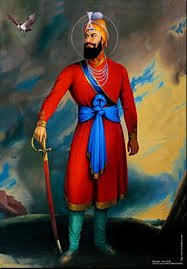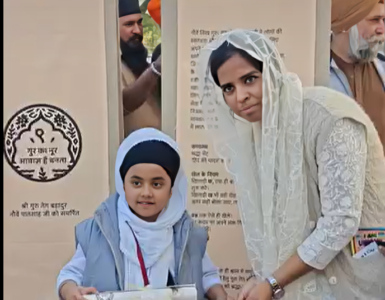As the evening breeze whispered through the curtains, Grandpa and Nini sat cozily by the fireplace, their faces illuminated by the flickering flames. With a gentle smile, Grandpa turned to Nini, his eyes twinkling with anticipation.
“Nini,” he said, his voice soft yet filled with reverence, “tonight, let us embark on a journey into the remarkable life of Guru Gobind Singh Ji, a towering figure in Sikh history whose bravery and wisdom continue to inspire countless souls.”
Grandpa: “Alright, my dear Nini, it’s bedtime again! Are you ready for another story?”
Nini: “Yes, Grandpa! I want to hear another story, please!”
Grandpa: “Okay, let me tell you a story from Sikh history. This one is about a remarkable leader named Guru Gobind Singh Ji. Have you heard about him before?”
Nini: “No, Grandpa, I haven’t. Please tell me!”
Grandpa: “Well, let me begin. Long ago, in the 17th century, in a land called India, there lived a spiritual leader named Guru Gobind Singh Ji. He was born to Guru Tegh Bahadar Ji and Mata Gujri Ji in Patna, Bihar. From a young age, Guru Gobind Singh Ji showed wisdom beyond his years. At the age of nine, he was granted the Guruship by the holy congregation, following his father’s instructions.”
Nini: “Wow, he must have been very special!”
Grandpa: “Indeed, he was, Nini. Guru Gobind Singh Ji was married to Mata Jeeto Ji and later to Mata Sundri Ji. He had four sons, Baba Ajit Singh Ji, Baba Jujhar Singh Ji, Baba Zorawar Singh Ji, and Baba Fateh Singh Ji. Mata Sahib Devan, though not married to Guru Ji in the worldly sense, was given the title of Jagat Mata for her spiritual union with him.”
Nini: “That’s so interesting, Grandpa! What did Guru Gobind Singh Ji do as a leader?”
Grandpa: “Guru Gobind Singh Ji was a warrior saint. He fought against tyranny and oppression, defending the rights of the downtrodden. He founded the Khalsa Panth in 1699, on the auspicious day of Vaisakhi, by blessing the Sikhs with divine nectar, or Amrit.”
Nini: “He sounds so brave, Grandpa!”
Grandpa: “He was, Nini. Guru Gobind Singh Ji led his followers in battles against injustice, never seeking to conquer land but to protect the weak and oppressed. He introduced unique traditions, like a martial celebration of Holi, blending spirituality with martial arts.”
Nini: “What happened next, Grandpa?”
Grandpa: “In 1704, Guru Gobind Singh Ji faced a siege at the fort of Anandpur Sahib. Despite a promise of safe passage, the Mughal forces betrayed him, leading to a fierce battle. During the confusion, his two younger sons and their grandmother got separated from him.”
Nini: “That’s so sad, Grandpa!”
Grandpa: “Yes, Nini, it was a challenging time. Eventually, Guru Gobind Singh Ji compiled the Granth Sahib, declaring it the eternal Guru for Sikhs. He emphasized seeking divine guidance to overcome ego and merge with the divine.”
Nini: “Thank you for sharing that story, Grandpa! Guru Gobind Singh Ji was truly inspiring.”
Another story
Grandpa: Nini, have I ever told you about Guru Gobind Singh Ji?
Nini: No, Grandpa. Who was Guru Gobind Singh Ji?
Grandpa: Guru Gobind Singh Ji was the tenth Sikh Guru, a spiritual leader, warrior, and poet. He played a significant role in shaping Sikh history and philosophy.
Nini: That sounds fascinating, Grandpa. Tell me more.
Grandpa: Well, Guru Gobind Singh Ji was born in 1666 in Patna, India. He succeeded his father, Guru Tegh Bahadur Ji, as the leader of the Sikhs at the young age of nine.
Nini: That’s quite a responsibility for a child.
Grandpa: Indeed, it was. Guru Gobind Singh Ji faced many challenges during his lifetime. He fought against injustice and oppression, defending the rights of all people, regardless of their religion or caste.
Nini: He sounds like a truly noble leader.
Grandpa: He was. Guru Gobind Singh Ji believed in the equality of all human beings and established the Khalsa, a community of initiated Sikhs who dedicated themselves to serving others and upholding righteousness.
Nini: That’s remarkable. How did he inspire others to join the Khalsa?
Grandpa: Guru Gobind Singh Ji led by example. He showed courage, compassion, and selflessness in everything he did. He encouraged his followers to embrace their inner strength and stand up for what is right.
Nini: It sounds like he was a great teacher as well as a leader.
Grandpa: Absolutely, Nini. Guru Gobind Singh Ji was not only a spiritual guide but also a source of inspiration and wisdom for generations to come. His teachings continue to resonate with people of all backgrounds today.
Nini: Thank you for sharing that with me, Grandpa. I feel inspired by Guru Gobind Singh Ji’s story.
Grandpa: You’re welcome, Nini. It’s important to learn about our history and the remarkable individuals who have shaped it. Guru Gobind Singh Ji’s legacy reminds us of the power of faith, courage, and compassion in overcoming adversity.
Nini: Grandpa, did Guru Gobind Singh Ji face any personal sacrifices during his lifetime?
Grandpa: Yes, Nini. Guru Gobind Singh Ji faced many hardships, including the loss of his father, Guru Tegh Bahadur Ji, who was executed for defending the rights of Hindus in Kashmir. Despite the challenges he faced, Guru Gobind Singh Ji remained steadfast in his commitment to his principles.
Nini: That must have been difficult for him.
Grandpa: It was, Nini. But Guru Gobind Singh Ji’s greatest sacrifice came when he offered his own life and the lives of his four sons in service to the Sikh faith. He faced immense persecution and adversity from the Mughal rulers but remained unwavering in his dedication to the Sikh community.
Nini: His sons sacrificed their lives too?
Grandpa: Yes, Nini. Guru Gobind Singh Ji’s sons, Sahibzada Ajit Singh, Sahibzada Jujhar Singh, Sahibzada Zorawar Singh, and Sahibzada Fateh Singh, all displayed remarkable courage and bravery in the face of adversity. They chose to stand by their father’s side and defend their faith, even at the cost of their own lives.
Nini: That’s incredibly brave.
Grandpa: Indeed, Nini. Guru Gobind Singh Ji and his sons are remembered not only for their sacrifices but also for their unwavering commitment to justice, equality, and righteousness.
Nini: Thank you for sharing their story with me, Grandpa. It’s important to remember the sacrifices of those who came before us and honor their legacy.
Grandpa: You’re welcome, Nini. Their sacrifices serve as a reminder of the power of faith and the importance of standing up for what is right, even in the face of adversity. Let us always strive to live by their example and uphold the values they cherished.
And so, Grandpa and Nini continued their conversation, reflecting on the remarkable sacrifices of Guru Gobind Singh Ji and his sons, finding inspiration and strength in their unwavering commitment to their faith and principles.















Add comment